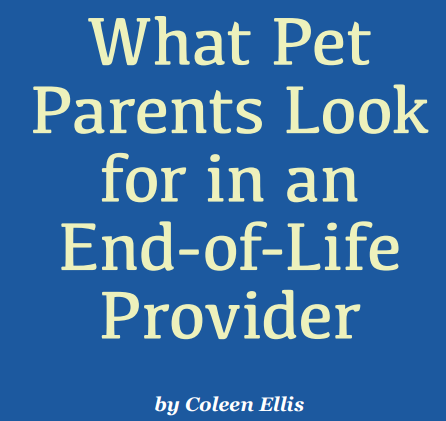(404) 312-6640
What Pet Parents Look for in an End-of-Life Provider
For pet parents, the bond they share with their furry, feathered, or scaled companions transcends mere ownership. These cherished members of the family occupy a central place in the heart and home. When the time comes to say goodbye, finding the right end-of-life provider is a decision laden with emotion, requiring careful consideration of services, empathy, and trust.
As the pet care industry evolves, so too have the expectations surrounding end-of-life care. Today’s pet parents seek more than a clinical and cold transaction; they want compassionate, holistic support that honors their pet’s life and provides solace during one of the most challenging moments they’ll face. They want to know they have the support and resources to honor their pet like they would do for any other beloved family member.
Let’s explore what matters most to pet parents when choosing an end-of-life provider.
COMPREHENSIVE AND CUSTOMIZED SERVICES
Let’s first explore the end-of-life walk, and the advancements which have been, and are being, made by veterinary professionals. The International Association for Animal Hospice and Palliative Care is an organization founded in 2009 to support pet parents through their pet’s final journey when they are looking for more than just “euthanasia.” The pet parent of today is demanding the services provided for furry, finned, and feathered friends mimic every aspect of what’s done for humans. Knowing they have other options with advanced pain management, creative palliative care options, and either hospice-assisted natural death or hospice-assisted euthanasia allows a pet parent the power to have more of a fulfilling final walk with their loved pet.
The International Association for Animal Hospice and Palliative Care is an organization growing in membership, solely due to the increase in demand from the pet parent on a different trajectory for their pet’s final days versus what’s been offered in the past. The association, albeit young, is already 2000 providers strong, worldwide. The leadership of the association and members are learning that the primary consideration for pet parents is the range of services offered by an end-of-life care provider. A one-size-fits-all approach simply doesn’t suffice when dealing with the unique needs of each pet and its family. For instance, end-of-life focused veterinary professionals offer this level of robust care for pets and their humans:
- In-Home Euthanasia: Many pet parents prefer the comfort of home for their pet’s final moments. In-home euthanasia allows pets to pass peacefully in familiar surroundings, reducing stress and anxiety for both the pet and their family.
- Pain Management and Palliative Care: Providers who offer hospice-like services are highly sought after. This includes pain management, mobility assistance, and guidance on maintaining quality of life during a pet’s final days or weeks.
- Lifestyle Assessment: IAAHPC members are fully equipped to guide families in areas such as food bowl placement, the use of Yoga mats for old, slippery paws, food, and nutrition changes for the geriatric animal, as well as “bucket list” guidance to ensure the final walk is one full of memories.
- 24/7 Availability: End-of-life needs can arise suddenly, and having access to a trusted professional at any hour provides immense peace of mind.
Pet parents are educating themselves more and more in this phase of an animal’s life. They are doing their due diligence in making sure the professional assisting them in these final days is equipped to fulfill their expectations. They appreciate and are looking for clear, compassionate communication about the process, including what to expect during euthanasia and how to recognize when it’s time to make the decision. Providers who take the time to educate and guide families through this journey foster trust and alleviate some of the uncertainty.
WHAT DOES THIS MEAN FOR YOU?
Today’s pet parents are demanding more in every aspect of their pet’s death. While they are turning to trusted professionals to assist with the medical side of their pet’s care, they are furthermore finding the next process partner who, too, helps them in fulfilling their expectations for their pet’s final arrangements.
In the past, pet’s bodies have been stored in garbage bags in chest freezers, waiting to be transported to the crematory or cemetery. Pet parents have basically been at the mercy of their vet clinic as to what happens to their pet’s body after death.
Trust me when I tell you. The loving pet parent of today wants more.
Are you ready to be the more?
WHERE DOES IT START IN CARING FOR A BELOVED PET?
With this, let’s dig deeper into what today’s pet lovers are seeking after death. As mentioned, the past process has been placing a pet’s body in a trash bag and transporting it to the place of final arrangements. Consider:
- The Removal Process: Lovingly taking the pet’s body into your organization’s care in a pet casket or a specially designed shroud.
- Be Prepared to Offer Other Services: Giving the pet parent permission to come to your facility for a final good-bye, in a peaceful setting fitting for any loved family member.
- They Don’t Know What They Don’t Know: Offer the family the opportunity to hold a funeral or memorial service. Raise the bar of expectations, and create a new family endeared to YOU because you asked and offered.
EXTENDED PET LOSS SUPPORT
As saying goodbye to a beloved pet is often as emotionally taxing as losing a human family member, be prepared to offer these services:
- Grief Counseling: Providers who connect families with grief counselors or support groups demonstrate an understanding of the profound loss felt by pet parents.
- Pet Loss Support Groups: Specifically created for pet lovers, these support groups allow families to share the life and love they had with a beloved pet, without fear of being judged because…. Well…. It’s “just a dog.”
- Holiday Services: The holidays are a rough time for any death. Including the death of an animal.
- Memorial Services: From intimate ceremonies to more elaborate events, memorial services give families a chance to celebrate their pet’s life and find closure.
- Follow-Up Communication: A simple check-in call or continued support not only allows your funeral home to show you care but also gives you another marketing message. Endear yourself to the roughly 50% of your market who call themselves “mommy and daddy” with this caring act.
This extended care shows pet parents that their loss is acknowledged and that their feelings are valid—a vital part of the healing process.
MEMORIALIZATION OPTIONS
Memorialization has become an integral part of the grieving process for pet parents. Offering diverse and personalized options for honoring a pet’s memory is highly valued and allows your organization to have another revenue opportunity. Popular choices include:
- Urns and Keepsakes: Most families choose cremation, with options for communal or private services. Providers who offer beautiful urns, keepsake jewelry, or other mementos ensure families can keep their pets close.
- Personalized Jewelry: Whether it’s a lovely pendant with a pet’s paw print or nose print (you know, noses are animal’s thumbprints! No two noses are alike!) or a vial to hold ashes or a locket of hair, pet lovers are proud to show their love for a sweet animal.
- Custom Memorials: Providers that partner with artists to create custom paintings, sculptures, or digital tributes give families unique ways to celebrate their pet’s life. Also, consider garden pieces and other creative permanent me morialization pieces to truly honor the lifestyle shared.
These options allow families to remember their pets in ways that reflect the bond they shared and the pets’ individuality.
THE ROLE OF ANTHROPOMORPHISM
Anthropomorphism—attributing human characteris tics to animals—plays a significant role in how pet parents approach end-of-life care. For many, their pets are not just companions but true family members, complete with person alities, quirks, and emotions.
This mindset shapes expectations around care. Pet par ents often look for providers who treat their pets with the same dignity and respect afforded to humans in similar cir cumstances. They want professionals who understand that decisions around euthanasia, memorialization, and grief are deeply personal and influenced by this familial perspective.
By recognizing and honoring the anthropomorphic con nection families have with their pets, your funeral home can deliver services that align with their client’s emotional needs
DIGNITY AND RESPECT
Dignity is a cornerstone of compassionate end-of-life care. Pet parents want assurance that their beloved companion will be treated with the utmost respect at every stage of the process. This includes:
- Gentle Handling: During euthanasia and after death, end-of-life professionals who handle pets with care and reverence ease the family’s anxiety and grief.
- Transparent Practices: Whether it’s the cremation process or the handling of remains, transparency builds trust. Families want to know their pet’s body is being treated with integrity.
- Personalized Care: Providers who take the time to learn a pet’s name, personality, and unique story create an environment where families feel seen and understood.
Dignity extends to the family as well. Death care professionals who show patience, compassion, and sensitivity to the family’s needs—without rushing or pressuring decisions— demonstrate a commitment to respectful care.
TRUSTED ADVISORS
Navigating end-of-life decisions is overwhelming. Pet parents value providers who serve as trusted advisors, offering guidance that is empathetic, knowledgeable, and tailored to their specific situation. This includes:
- Educational Resources: Providing resources and supporting information about Children and pet loss, surviving pets and their grief, as well as helping a pet lover with their own grief is another way to share your organization’s commitment to your community. Pet parents are hungry for these kinds of resources. Be that for them! Furthermore, there is no “traditional” when it comes to pet loss. Offer ideas on how they can honor and pay tribute to their beloved pet. Trust me, they will be eternally grateful for that permission to do “something.”
- Emotional Support: Listening without judgment and validating the family’s feelings fosters trust and comfort.
- Support for the Whole Family: When it comes to the family pet, adults are not only struggling with their own journey, but they are also at a loss in how to guide their children. Help them. Offer to speak to the children. Be a lifeline for them!
WHY THESE ELEMENTS MATTER
Ultimately, pet parents want to know that their beloved companion’s life and legacy will be treated with the care and respect they deserve. The grief of losing a pet is deeply personal, and the right end-of-life professional can make a profound difference in how families navigate this challenging time.
Death care professionals who excel in these areas don’t just meet expectations; they create a lasting impact, fostering gratitude and trust that extends far beyond the services rendered. Being the trusted resource for the beloved pet will certainly foster a sense of loyalty for the next family death experienced.
Furthermore, for pet parents, knowing their pet was honored, comforted, and cherished until the very end is the greatest gift an end-of-life professional can offer.






Comments